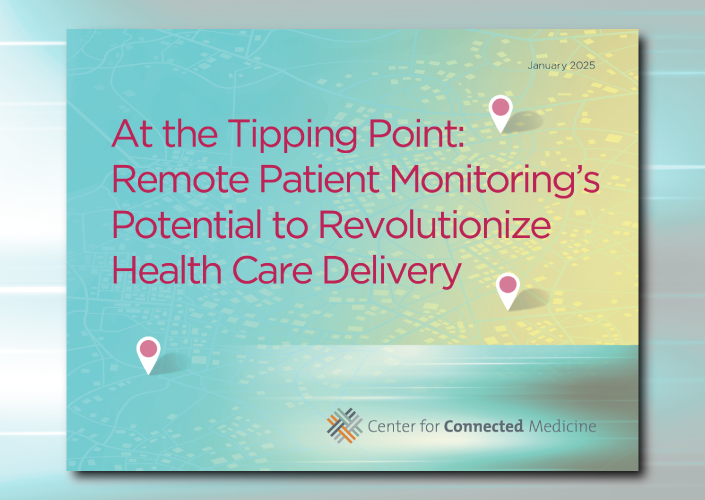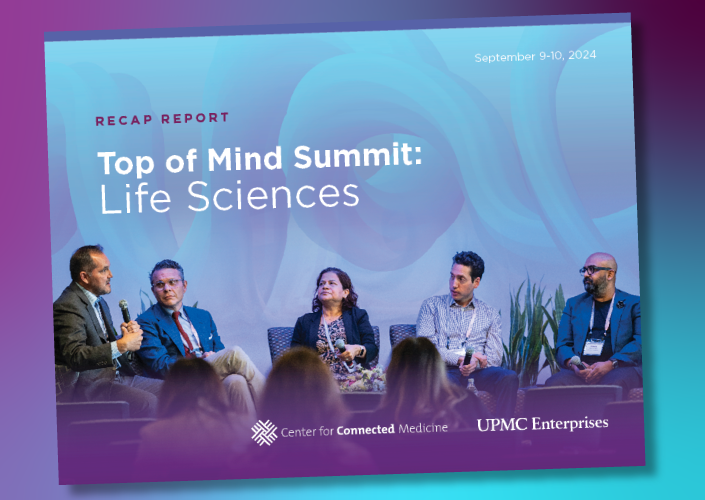Experts at Top of Mind Online debate what it will take to accelerate adoption of artificial intelligence
Health system leaders identified artificial intelligence (AI) as the most exciting emerging technology in health care, according to the Top of Mind for Top Health Systems research from the Center for Connected Medicine (CCM).
While many agree there is tremendous potential for AI to have a positive impact on health care, deployment of the technology in health systems remains modest. How to accelerate AI’s use in health care was one of the topics of discussion for a panel of experts at the CCM’s Top of Mind Online virtual summit in December 2020.
The panel — Breakout AI — was moderated by Derek C. Angus, MD, Chief Healthcare Innovation Officer at UPMC, and included the following leaders:
- Taha Kass-Hout, MD, Director, Machine Learning and Chief Medical Officer, Amazon Web Services
- Shiv Rao, MD, Co-founder and CEO, Abridge
- Suchi Saria, PhD, John C. Malone Professor of Computer Science, Bloomberg School of Public Health, Johns Hopkins University
Building on momentum and trust
Expansion of AI in health care requires that leaders build on momentum already behind AI and continue to create trust in the technology, said Dr. Rao.
A way momentum is building for AI is through efforts to give patients more control over and access to their health data, which they can share with AI-enabled applications. For example, the Blue Button API, which the Centers for Medicare and Medicaid Services (CMS) has released, allows Medicare beneficiaries to share their claims data with applications.
Greater availability of data and increasing alignment of incentives between payers and providers thanks to value-based care are coming together at the right time to spur AI adoption, Dr. Rao said. “That is the moment that we’re in right now.”
When it comes to trust, providers and health systems gain trust in AI applications when those systems are transparent, reliable, and credible, Dr. Rao said. “Over the last couple of years, trust has been building with scientific papers being published showing the effectiveness of AI. I think those have done wonders in terms of starting to build trust in the clinical community,” he said.
Platforms can simplify adoption
Platforms that simplify machine learning and provide data solutions for users in health care will also be important – which is something that Amazon Web Services is working on, said Dr. Kass-Hout. “How do we demystify the entire stack of machine learning end to end so that we give the right tool to the right customer to do the right job,” he said.
AI and machine learning can help to bring structure to the vast amount of data in health care, such as using natural language processing to read and analyze physician notes and other unstructured data in electronic health records.
“Let’s take advantage of the last decade of digitization that started with the medical record, which was a great start,” Dr. Kass-Hout said. “We have the right tools to bring understanding to the data.”
User experience will be key to advancing AI
Despite the positive trends of greater availability of data, empowered consumers, and growing trust, Dr. Angus questioned whether that was enough for health systems to adopt AI at scale.
“It’s not entirely clear to me that the hospital CEOs or the physicians in those hospitals lie in bed in the middle of the night thinking, ‘if I don’t get this machine learning algorithm implemented, I’m going to lose market share,’” Dr. Angus said.
Dr. Saria suggested that the slow uptake and skepticism among health systems was natural and healthy. “Medicine as a field is risk averse, as it should be, because at the end of the day human lives are involved and mistakes are very costly,” she said. “And so, the skepticism towards anything new is warranted.”
But despite the aversion to risk, health systems are likely to be pushed to adopt AI and other technology for competitive reasons, Dr. Saria said. In every other industry, as more data about consumers became available, “it’s fundamentally changed how businesses operate,” she said.
Both Dr. Rao and Dr. Saria agreed that user experience will be essential with AI and machine learning applications.
“User experience is going to be really key,” Dr. Rao said. “When we’re building machine learning centered solutions for a doctor or a nurse, I think those solutions will live and die by how well they can integrate into the workflow.”
Learn more about the CCM’s Top of Mind program
The CCM’s Top of Mind program focuses on telehealth, artificial intelligence and revenue cycle management through a research report, webinar, virtual roundtables, and a virtual summit. Read about all the components of the program that seeks to examine innovation and digital health priorities in the year ahead.



